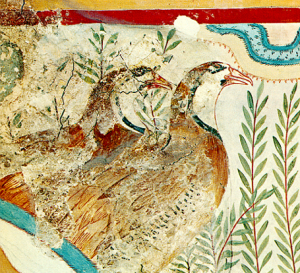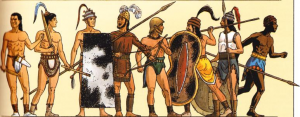(Boylove Documentary Sourcebook) - An Excerpt from 'On the Characteristics of Animals' by Aelian

From On the Characteristics of Animals (Ancient Greek: Περὶ Ζῴων Ἰδιότητος Peri Zōōn Idiotētos; Latin: De Natura Animalium [Early 3rd Century AD]), Book 4, Chapter 1, by Aelian, translated by A. F. Scholfield, Volume 1, Loeb Classical Library (London: William Heinemann; Cambridge, Massachusetts: Harvard University Press, 1958). Footnote omitted.
Note: The names of the erastes and the eromenos who appear in the anecdote narrated in the excerpt below are not found in any surviving work by Aelian.[1] A similar story about a Theban lover is cited in Chapter 18 of the Life of Pelopidas (Early 2nd Century AD) by Plutarch.
Partridges are the most incontinent of birds; that is the reason for their passionate love of the female birds and for their constant enslavement to lust. So those that rear fighting Partridges, when they egg them on to battle with one another, make the female stand each by her mate, as they have found this to be a device for countering any cowardice or reluctance to fight. For the Partridge that is defeated cannot endure to show himself either to his loved one or to his spouse. He will sooner die under the blows than turn away from his adversary and dare in his disgrace to look upon her whose good opinion he courts.
The Cretans also have taken this view regarding Cretan lovers. For I have heard that a Cretan lover, who had beside other qualities that of a fine soldier, had as his favourite a boy of good birth, conspicuous for his beauty, of manly spirit, excellently fitted by nature to imbibe the noblest principles, though on account of his youth he was not yet called to arms. (I have elsewhere given the name of the lover and of the beautiful boy.) Now the Cretans say that the young man did acts of valour in the fight, but when the enemy’s massed line pressed him hard, he stumbled over a dead body that lay there and was thrown down. Whereupon one of the enemy who was nearest, in his eagerness was about to strike him in the back. But the man turned and exclaimed ‘Do not deal me a shameful and cowardly blow, but strike me in front, in the breast, in order that my loved one may not judge me guilty of cowardice and refrain from laying out my dead body: he could not bear to go near one who so disgraces himself.’

References
- ↑ Aelian, On the Characteristics of Animals, trans. A. F. Scholfield, Vol. 1, Loeb Classical Library (London: William Heinemann; Cambridge, Massachusetts: Harvard University Press, 1958), p. 215.
See also
- Adult friend (dictionary)
- Age of attraction (dictionary)
- Athenian pederasty
- Boylove
- Ephebophilia
- Greek love
- Historical boylove relationships in ancient Greece
- Loved boy (dictionary)
- Minor-attracted person (dictionary)
- Pederasty in ancient Greece
- Pedophilia
- Philosophy of ancient Greek pederasty
- Spartan pederasty
- Theban pederasty
- Young friend (dictionary)
External links
- L 446 Aelian Characteristics Of Animals I: 1 5 (Internet Archive)
- PEDERASTY IN ANCIENT CRETE (Greek Love Through the Ages)
- PURSUIT AND FLIGHT BY SIR KENNETH DOVER (Greek Love Through the Ages)
- DID THE GREEKS PEDICATE THEIR LOVED BOYS? (Greek Love Through the Ages)
- Plutarch, Pelopidas, chapter 18 (Perseus Digital Library)
